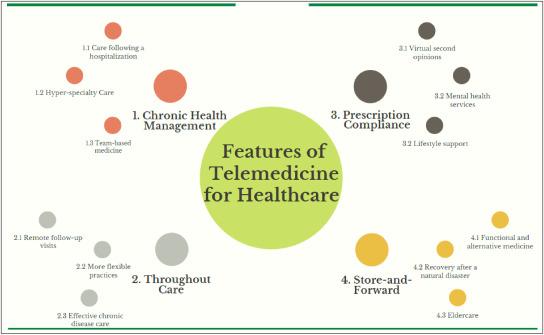In the quiet hum of our digital age, where screens flicker and data pulses invisibly through the air, a silent revolution is reshaping the landscape of personal health. Once confined to sterile clinics and the pages of dusty medical textbooks, the journey to well-being now unfolds in the palm of your hand. Technology, with its relentless innovation, is crafting a new narrative—one where personal health is no longer a passive pursuit but an interactive adventure. From wearable devices that trace the rhythm of our hearts to apps that decode the mysteries of our genomes, the fusion of technology and health is empowering individuals to become the architects of their own wellness. As we stand on the cusp of this digital renaissance, it becomes crucial to explore how these advancements are not just enhancing our lives, but fundamentally transforming the way we understand and manage our health.
Wearable Wonders Transforming Daily Health Monitoring
In the ever-evolving landscape of personal health, wearable technology has emerged as a game-changer, offering unprecedented access to real-time health data. These innovative devices are no longer just about counting steps; they have become sophisticated health companions that provide insights into various aspects of our well-being. From smartwatches that monitor heart rates and sleep patterns to fitness trackers that gauge stress levels, wearables are empowering individuals to take proactive steps towards healthier lifestyles.
- Continuous Health Monitoring: Devices now offer 24/7 tracking, providing a comprehensive overview of one’s health metrics.
- Personalized Health Insights: Leveraging AI, wearables can analyze data to deliver personalized health recommendations.
- Integration with Health Apps: Seamless syncing with mobile applications allows for detailed health tracking and goal setting.
As these wearable wonders continue to advance, they promise to redefine how we approach personal health, transforming daily monitoring into an effortless part of our routines.

Telemedicine: Bridging the Gap Between Patients and Providers
In an era where connectivity defines our daily lives, technology is making strides in personal health management by enabling patients and healthcare providers to interact in unprecedented ways. Telemedicine is at the forefront of this transformation, offering a digital bridge that eliminates geographical barriers and provides timely medical care. This innovation is particularly beneficial for those in remote areas, allowing them access to specialized medical professionals without the need for extensive travel.
Key advantages of this technological evolution include:
- Convenience: Patients can consult with healthcare professionals from the comfort of their homes.
- Accessibility: Individuals with mobility challenges or those residing in rural areas can receive medical attention more easily.
- Efficiency: Reduced waiting times and streamlined communication between patients and providers.
- Continuity of Care: Ongoing monitoring and follow-up can be seamlessly integrated into daily routines.
As telemedicine continues to evolve, it promises to enhance the quality of healthcare by fostering a more personalized and responsive approach to patient needs, ensuring that everyone can receive the care they deserve, regardless of location.

AI in Healthcare: Personalized Solutions for Better Outcomes
In the realm of healthcare, artificial intelligence is transforming the landscape by crafting personalized solutions that cater to individual patient needs. By leveraging vast amounts of data, AI can analyze patterns and predict outcomes with unprecedented accuracy. This enables healthcare providers to tailor treatments that align with the unique genetic makeup and lifestyle factors of each patient, ensuring a more effective and efficient healthcare experience.
AI-driven personalized health solutions include:
- Predictive Analytics: By analyzing historical health data, AI can forecast potential health risks and recommend proactive measures.
- Customized Treatment Plans: AI algorithms can devise treatment plans that are specifically suited to a patient’s genetic profile and medical history.
- Remote Monitoring: Wearable devices powered by AI track vital signs and alert healthcare providers to any anomalies, allowing for timely interventions.
These advancements not only enhance patient care but also pave the way for a future where healthcare is as unique as the individuals it serves.

Embracing Health Apps: Practical Tips for Integrating Tech into Your Routine
Incorporating health apps into your daily routine can be a transformative experience, offering personalized insights and motivation to achieve your wellness goals. To make the most out of these digital tools, start by identifying your specific health objectives. Whether it’s tracking your fitness, monitoring your nutrition, or improving mental well-being, there are apps tailored to meet your needs. Once you’ve pinpointed your goals, explore various options and choose apps that are user-friendly and offer features that align with your lifestyle.
- Start small: Introduce one app at a time to avoid feeling overwhelmed.
- Set reminders: Utilize app notifications to establish a consistent routine.
- Integrate with other devices: Sync apps with wearable technology for comprehensive data.
- Join communities: Engage with online groups within the app for support and motivation.
- Review and adjust: Regularly assess your app usage and adjust settings to enhance effectiveness.
By thoughtfully selecting and integrating health apps into your routine, you can leverage technology to foster a healthier, more balanced lifestyle. Remember, the key is to maintain consistency and allow the app to become a natural part of your daily activities.








